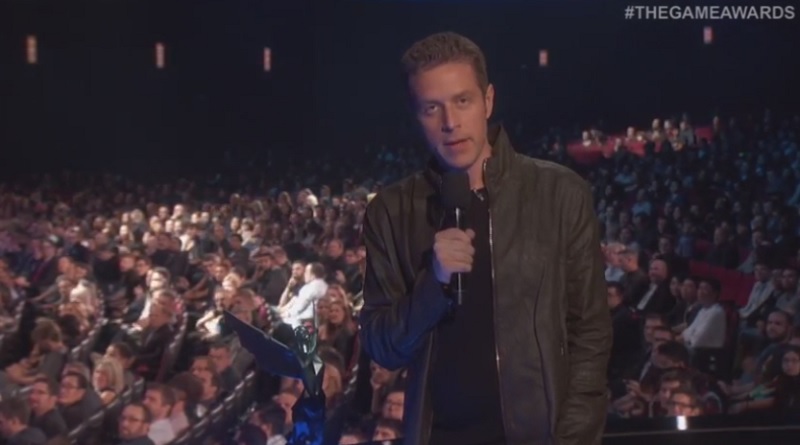People don’t always say kind things about game award programs like The Game Awards, but last night’s livestreamed hype show gave us our first real glimpse into the games of 2016. And for the most part, I liked what I saw. The show had surprise game announcements as well as new content from games that have been a long time in the making and are expected to show up next year.
There were enough “world premieres” to hold my attention during the two hour broadcast. We saw announcements of Rock Band VR, Psychonauts 2, Far Cry Primal, Batman from Telltale Games, Shadow Complex Remastered, Rocket Leagues‘s debut on the Xbox One, and Shaq Fu: A Legend Reborn.
And we saw new trailers for Uncharted 4: A Thief’s End, Quantum Break, The Walking Dead: Michonne, and Star Citizen.
We know there are other previously announced 2016 titles coming, like ReCore, Deus Ex: Mankind Divided, Horizon: Zero Dawn, Dishonored 2, and Mass Effect: Andromeda, Firewatch, Hitman, Street Fighter V, Battleborn, Mirror’s Edge: Catalyst, No Man’s Sky, Ratchet & Clank, Doom, Fable Legends, Homefront: The Revolution, Zelda for the Wii U, For Honor, Tom Clancy’s The Division, and Tekken 7.
Some of those 2016 titles will get delayed, but it’s an impressive lineup across a variety of platforms. Of the brand new sneak peeks we saw last night, I thought that Far Cry Primal from Ubisoft looked like a winner. The Stone Age game pits you as a human hero against beasts such as saber tooth tigers and mammoths. And if you can become the master of these beasts, you can turn them loose against other human enemies.
I’m most looking forward to Uncharted 4, debuting March 16. The trailer showed that it’s more escapist fun packed inside a grand Nathan Drake adventure.
And I really liked the look of Star Citizen. The latter game has gotten a lot of bad press, but I’d love to see them prove the naysayers wrong. It makes me wonder what kind of cool game would result if Chris Roberts got hold of a Wing Commander or Star Wars license.
The Witcher 3: Wild Hunt walked away with the Game of the Year award. That comes from CD Projekt Red, a Polish game studio that would have been considered an underdog in any year. It’s one more example of how the gaming world is flat, and games can be made anywhere.
The show was at its best when it gave you a moment to think about something. Greg Miller received an award as the “trending gamer.” In the wake of GamerGate, the Internet rage movement that led to the harassment of game developers, Miller offered his heartfelt thanks to game developers.
“We would not be the people we are today if it wasn’t for video games,” he said. “Thank you for your art, and know that we are forever in your debt.”
It was also great to see Louis Castle and Brett Sperry, the founders of Westwood Studios, receive an “industry icon” award for the creation of Dune II (which I played obsessively when it first came out) and the real-time strategy genre. They noted that the competition between them and Blizzard (maker of the Warcraft and StarCraft RTS series) helped accelerate the growth of the RTS industry. We wouldn’t have had so many beloved games without that competition.
Sperry told creators of today, “Keep pushing the limit.” And Castle said to keep making games and “I’m not going to stop til I fall.”
Geoff Keigley, host of the Game Awards, reminded us about the value of game creators when he noted that Hideo Kojima, creator of the Metal Gear series, was told by Konami’s lawyers that he was barred from going to the awards show. Kojima had to watch the awards show from afar, Keighley said. That was a grim reminder of what happens when we see clashes between art and business interests. I’d like to see what Konami has to say for itself in denying Kojima a chance to receive recognition from his peers.
In a final note, the show’s tribute to Satoru Iwata, the former president of Nintendo who died this summer, was first class. Reggie Fils-Aime, noted that Iwata was unique in gaming as someone who contributed to three of the five game systems that have sold more than 100 million units. Fils-Aime said Iwata was fearless, and “he always championed an idea he truly believed in.”
It was interesting to hear that tribute on the same day I read the Time magazine interview with Nintendo’s new CEO, Tatsumi Kimishima, talking about the company’s plans for the future. I think Nintendo should not only learn from Iwata’s triumphs, but they should also remember his worst mistake ever: underestimating the impact that smartphones would have on gaming. Nintendo is preparing mobile games with DeNA, and it is talking about its NX dedicated game machine next year. It would be such a great accomplishment for Nintendo to carry on Iwata’s legacy by making these initiatives into home runs.
Let’s hope that 2016 bring us all of the good news and awesome games that the gamers deserve.
VentureBeat's mission is to be a digital town square for technical decision-makers to gain knowledge about transformative enterprise technology and transact. Learn More




